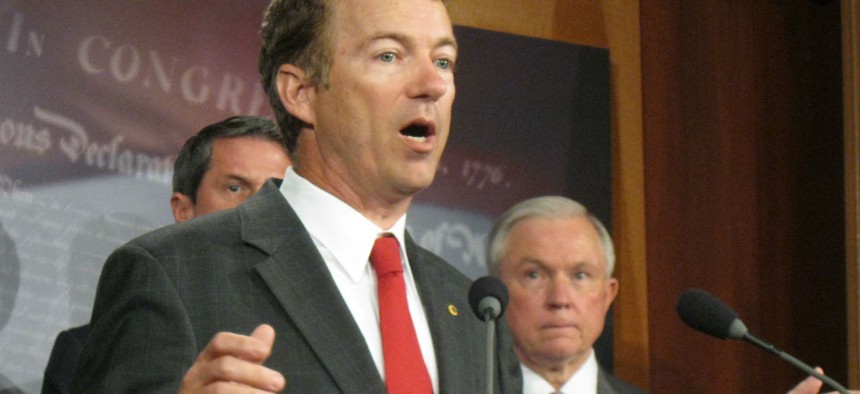
Sen. Rand Paul, R-Ky. Photo via Flickr user Talk Radio News Service
Rand Paul Doesn't Really Want To Repeal Every Executive Order Ever
Senator did not mean his comment literally, aide says.
For a brief moment Friday, many were under the impression that Republican Sen. Rand Paul would want to repeal all executive orders as president, probably because he said that he would repeal all executive orders if he was president. But as a Paul aide told The Huffington Post, the senator didn't mean to be taken at his word.
"Senator Paul's statement was meant to emphasize this president's overt and unconstitutional executive orders," aide Doug Stafford told The Huffington Post. "It was not meant to be taken literally."
During a talk with the New Hampshire chapter of Generation Opportunity (a millennial-focused group best known for using a creepy Uncle Sam mascot to convince people not to enroll in Obamacare) a young man asked Paul if he would repeal any executive orders. “I think the first executive order that I would issue would be to repeal all previous executive orders,” Paul said, according to Breitbart. He continued:
Democracy is messy, but you have to build consensus to pass things. But it’s also in some ways good, because a lot of laws take away your freedom. So it should be hard to pass a law. And it, frankly, when you do it the proper way, is.
In an interview with Breitbart after the talk, Paul said that he believed President Obama is "destroying the separation of powers." While he disagrees with the administration's policies, "the problem is is he’s doing it in an unconstitutional way."Accusing Obama of executive overreach is a common theme among Republicans. And while Obama has issued fewer orders than any president since FDR, Republicans argue it's the content of the orders that's the problem. That's why House Republicans, led by Speaker John Boehner, are suing Obama over his order to delay Obamacare's employer mandate, even though Republicans don't actually like the employer mandate.
Still, to repeal all of the tens of thousands of executive orders would be a stretch.Some executive orders — like 2012's Deferred Action for Childhood Arrivals order that allows people brought into the country illegally as children to work — are more controversial than others, but many would be more controversial to eliminate. There is an order that offers assistance to Historically Black Colleges and Universities, an order that ended employment discrimination by federal contractors, and an order that desegregated the armed forces.
(Image via Flickr user Talk Radio News Service)






